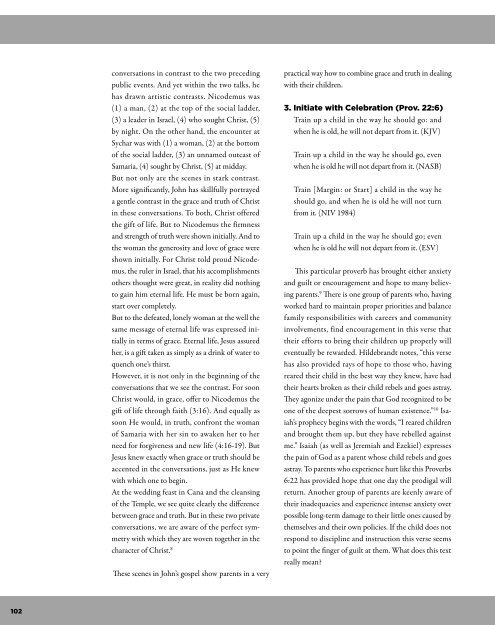here - The Southern Baptist Theological Seminary
here - The Southern Baptist Theological Seminary
here - The Southern Baptist Theological Seminary
You also want an ePaper? Increase the reach of your titles
YUMPU automatically turns print PDFs into web optimized ePapers that Google loves.
conversations in contrast to the two preceding<br />
public events. And yet within the two talks, he<br />
has drawn artistic contrasts. Nicodemus was<br />
(1) a man, (2) at the top of the social ladder,<br />
(3) a leader in Israel, (4) who sought Christ, (5)<br />
by night. On the other hand, the encounter at<br />
Sychar was with (1) a woman, (2) at the bottom<br />
of the social ladder, (3) an unnamed outcast of<br />
Samaria, (4) sought by Christ, (5) at midday.<br />
But not only are the scenes in stark contrast.<br />
More significantly, John has skillfully portrayed<br />
a gentle contrast in the grace and truth of Christ<br />
in these conversations. To both, Christ offered<br />
the gift of life. But to Nicodemus the firmness<br />
and strength of truth were shown initially. And to<br />
the woman the generosity and love of grace were<br />
shown initially. For Christ told proud Nicodemus,<br />
the ruler in Israel, that his accomplishments<br />
others thought were great, in reality did nothing<br />
to gain him eternal life. He must be born again,<br />
start over completely.<br />
But to the defeated, lonely woman at the well the<br />
same message of eternal life was expressed initially<br />
in terms of grace. Eternal life, Jesus assured<br />
her, is a gift taken as simply as a drink of water to<br />
quench one’s thirst.<br />
However, it is not only in the beginning of the<br />
conversations that we see the contrast. For soon<br />
Christ would, in grace, offer to Nicodemus the<br />
gift of life through faith (3:16). And equally as<br />
soon He would, in truth, confront the woman<br />
of Samaria with her sin to awaken her to her<br />
need for forgiveness and new life (4:16-19). But<br />
Jesus knew exactly when grace or truth should be<br />
accented in the conversations, just as He knew<br />
with which one to begin.<br />
At the wedding feast in Cana and the cleansing<br />
of the Temple, we see quite clearly the difference<br />
between grace and truth. But in these two private<br />
conversations, we are aware of the perfect symmetry<br />
with which they are woven together in the<br />
character of Christ. 8<br />
<strong>The</strong>se scenes in John’s gospel show parents in a very<br />
practical way how to combine grace and truth in dealing<br />
with their children.<br />
3. Initiate with Celebration (Prov. 22:6)<br />
Train up a child in the way he should go: and<br />
when he is old, he will not depart from it. (KJV)<br />
Train up a child in the way he should go, even<br />
when he is old he will not depart from it. (NASB)<br />
Train [Margin: or Start] a child in the way he<br />
should go, and when he is old he will not turn<br />
from it. (NIV 1984)<br />
Train up a child in the way he should go; even<br />
when he is old he will not depart from it. (ESV)<br />
This particular proverb has brought either anxiety<br />
and guilt or encouragement and hope to many believing<br />
parents. 9 T<strong>here</strong> is one group of parents who, having<br />
worked hard to maintain proper priorities and balance<br />
family responsibilities with careers and community<br />
involvements, find encouragement in this verse that<br />
their efforts to bring their children up properly will<br />
eventually be rewarded. Hildebrandt notes, “this verse<br />
has also provided rays of hope to those who, having<br />
reared their child in the best way they knew, have had<br />
their hearts broken as their child rebels and goes astray.<br />
<strong>The</strong>y agonize under the pain that God recognized to be<br />
one of the deepest sorrows of human existence.” 10 Isaiah’s<br />
prophecy begins with the words, “I reared children<br />
and brought them up, but they have rebelled against<br />
me.” Isaiah (as well as Jeremiah and Ezekiel) expresses<br />
the pain of God as a parent whose child rebels and goes<br />
astray. To parents who experience hurt like this Proverbs<br />
6:22 has provided hope that one day the prodigal will<br />
return. Another group of parents are keenly aware of<br />
their inadequacies and experience intense anxiety over<br />
possible long-term damage to their little ones caused by<br />
themselves and their own policies. If the child does not<br />
respond to discipline and instruction this verse seems<br />
to point the finger of guilt at them. What does this text<br />
really mean?<br />
102
















